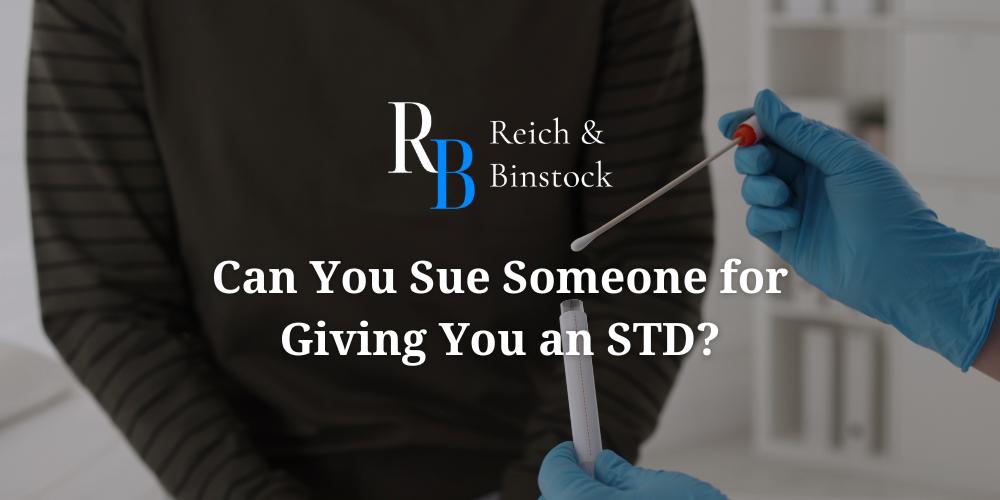While STD testing is becoming less and less taboo, many people still feel like there is a stigma surrounding STDs, causing them to forgo testing and leave STDs out of the conversation when getting intimate. However, if someone knowingly has sex with another person without disclosing that they have an STD, they may be held liable for negligence, even if the sex was consensual. So, can you sue someone for giving you an STD?
If you are interested in suing someone for giving you an STD, the Houston sexual abuse attorneys are here to help. With over 30 years of experience, you can rest assured that your case is in good hands. We work hard to ensure our clients receive the compassion and discretion they deserve, especially when it comes to sexual abuse cases.
Call us at (713) 622-7271 to schedule a free consultation with one of our attorneys, where we’ll evaluate your case and develop the best plan of action for you.
What Is a Sexually Transmitted Disease (STD)?
Sexually transmitted diseases (STDs) are exactly what they sound like: they are diseases that can be passed from one person to another through sexual intercourse or sexual contact. Having unprotected sex with someone could potentially expose you to one of these diseases. That’s why it’s important to use protection and have yourself tested for STDs regularly, especially if you and/or your partner are seeing multiple people.
STD vs. STI

The main difference between an STD and an STI is the name. An STD is a sexually transmitted disease whereas an STI is a sexually transmitted infection. Both begin with an infection or virus transmitted from one person or another as a result of sexual activity.
An STI refers to the infection itself, which is the presence of foreign bacteria, viruses, or microbes in the body. An STD refers to the resulting infectious disease the person suffers from as a result of the infection. Diseases cause cell damage and can disrupt the body’s normal biological functions.
What STDs Do You Legally Have to Disclose to a Sexual Partner?
Technically, there are no federal laws that require people to disclose their STD status to their sexual partners. However, there are states that have specific laws that require people to disclose their HIV status to their sexual partners. Additionally, while it may not be a crime to disclose an STD in some places, it can be illegal to expose someone to an STD through sexual intercourse, especially if it is done knowingly or with ill intent.
The Presence of Consent
When someone engages in consensual sexual relations with another person, they are consenting to the sex acts, but they are not consenting to be exposed to dangerous and potentially deadly STDs. This means that even if the sex was consensual, the person who was exposed to the STD can still sue their partner for financial damages.
In a sexual battery case, if the sex was non-consensual, and the person who was assaulted was exposed to an STD, they can also file an STD lawsuit against their assailant for their losses. They can also sue the assailant regardless of whether or not they are convicted of a sex crime related to the accident.
Which States Criminalize STD Exposure?

While there is no federal legislation addressing criminalization of STD exposure, there are many different state laws that criminalize exposing a sexual partner to an STD. This means that if someone exposes you to an STD without your consent, they could face criminal charges.
STD criminalization laws vary from state to state, with some states charging people with sexual battery or reckless endangerment for failure to disclose an STD before sexual contact or intercourse. Additionally, some states even have laws that specifically criminalize HIV exposure.
According to the Centers for Disease Control (CDC), more than half of the states in the U.S. have specific criminalization laws against HIV exposure. Some states criminalize any known HIV exposure, whereas some only have sentence enhancement laws regarding HIV transmission. This means that if someone exposes another person to HIV while committing a sex crime or other crime, they could face additional criminal penalties.
States with HIV-specific laws on the books include:
- Arkansas
- North Carolina
- South Carolina
- Colorado
- North Dakota
- South Dakota
- Florida
- Georgia
- Idaho
- Indiana
- Kentucky
- Louisiana
- Maryland
- Michigan
- Mississippi
- Nebraska
- Ohio
- Oklahoma
- Pennsylvania
- South
- Tennessee
- Utah
- Washington
- Wisconsin
States with STD laws that criminalize exposure to other STDs (but could apply to HIV as well) include:
- Alabama
- Arizona
- California
- Iowa
- Kansas
- Minnesota
- Missouri
- Montana
- Nevada
- New Jersey
- New York
- Rhode Island
- Virginia
- West Virginia
Which STDs Can You Sue Someone for Giving You?

If your sexual partner knew they could be giving you any of the following STDs, and they engaged in unprotected sexual intercourse or sexual contact with you, they could be held liable for their negligence. These STDs include:
- AIDS and HIV
- HPV or HPV-induced cervical cancer
- Herpes
- HBV (Hepatitis B)
If you contracted any of these STDs after a sexual encounter, and your partner did not disclose their STD status before engaging in sex activities with you, you should contact a liability law firm and discuss your legal options with an attorney.
How to Sue Someone for an STD Infection
Even in a state like Texas that does not criminally prosecute exposure to STDs, you can still sue someone for reckless or intentional exposure to an STD. This means that you can file a personal injury lawsuit against them for financial compensation to help repay you for your losses.
Filing a Personal Injury or Civil Lawsuit
If your partner knew they were exposing you to a sexually transmitted disease, you could file an STD lawsuit for compensation for losses like medical bills and emotional trauma. A personal injury attorney can walk you through the process of filing a lawsuit and reaching a settlement or taking the case to civil court.
If you are a victim of this form of negligence, you deserve the best legal representation possible. The attorneys at Reich & Binstock are prepared to offer you with the legal counsel you need to seek justice in your case. Call us at (713) 622-7271 to schedule a consultation with one of our sexual abuse attorneys at no cost to you.
What Are the Penalties for STD Exposure?

If someone breaks criminal laws regarding STD exposure, they could face jail time, fines, parole, community service, or even sex offender registration, depending on the specific state laws they violated. However, even if someone is not facing criminal penalties for STD exposure, they can still face civil penalties for their actions in a personal injury lawsuit.
Someone who knowingly exposes their sexual partner to an STD can be required to pay the victim compensation for:
- Medical expenses
- Lost wages
- Pain and suffering
- Emotional distress
- Physical therapy
- Counseling
- Funeral and burial expenses, in the event of a wrongful death
What Kind of Lawyer Do You Need to Sue Sexual Partners for STD Exposure?

In order for the case to be successful, STD lawsuits require expert legal guidance from an experienced personal injury attorney. Personal injury lawyers will investigate the circumstances of the case in order to prove the four elements of negligence. Lawyers can only prove negligence if the following elements are present in the case:
- A duty of care – a reasonable expectation of care towards another person
- A breach of duty of care – a failure to meet that expectation
- Causation – the link between the breach of care and the victim’s injuries
- Damages – the losses the victim suffered due to the injury or incident
Attorneys will also show the court what losses the victim suffered as a result of their sexual partner’s failure to disclose an STD. This can include any physical or emotional trauma caused by the partner’s inaction.
Contact a Sexual Abuse Attorney with Reich & Binstock Today
If you are looking to sue someone for giving you an STD, you need aggressive legal representation. That’s why the Texas liability attorneys at Reich & Binstock are here to help victims of sexual abuse. We’ll help you understand your legal options and understand the court process so that you can seek compensation for your losses.
Call us at (713) 622-7271 or contact us online and schedule a free case evaluation with an attorney on our team today.














